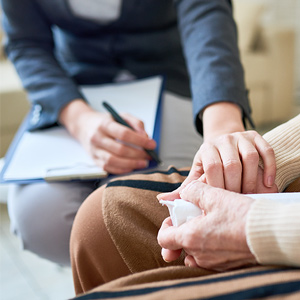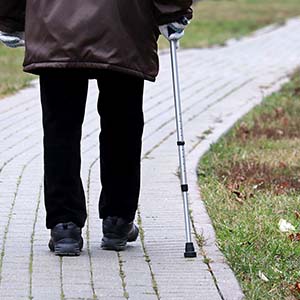-
Your Cancer Guide
The Fear of Being a BurdenAccepting help from others when you have a cancer diagnosis isn't a sign of weakness.
by Hester Hill Schnipper
-
Healthy Habits
Finding the Right CounselorYou may have to try several options before you find the right fit.
by Tara Santora
-
Caregiving With Confidence
The Money DiscussionBringing up the topic of finances might feel taboo, but transparency can help ensure that caregivers can plan and pivot during a loved one's treatment.
by K.J. Bannan
-
Healthy Habits
An Alternative to MeatAre new plant-based meat alternatives a better way to satisfy burger cravings?
by Erin O’Donnell
-
Q&A
Invisible CareIn a new book, Kate Washington offers a piercing personal account from the front lines of caregiving, and places her experiences in the broader context of societal norms.
by Marci A. Landsmann
-
Oncology Takes on Cannabis
People take cannabis to treat an array of cancer-related symptoms and side effects. Legal prohibitions have stymied attempts at research into cannabis in cancer patients, but doctors are finding creative ways to study its effects.
by Kate Yandell
-
Sound Advice
How Much Fiber is Too Much?Clinical dietitian-nutritionist Cara Anselmo offers advice on how to eat a fiber-rich diet without causing digestive discomfort.
-
Facts and Stats
Looking Closely at Lung CancerWhile there are many kinds of lung cancer, screening recommendations are standard across the board.
by Bradley Jones
-
Practical Considerations for Cannabis
People with cancer who are thinking about using cannabis to manage cancer-related symptoms should seek answers to some practical questions.
by Kate Yandell
-
Exercise, Cancer and Aging
A study on aging shows that cancer survivors are at higher risk of losing strength and walking more slowly compared to those with no cancer history. Exercise is one way to combat this decline.
by Marcus A. Banks
Cancer Talk
Physical Activity Linked to Lower Colon Cancer Recurrence
Participating in a structured exercise program after treatment was associated with a reduced risk of recurrence in people who had colon cancer.
by Sandra Gordon
Gaps in Survivorship Care Leave Unmet Needs After Cancer TreatmentA survey of head and neck cancer survivors reveals that many are not getting adequate survivorship care and may not even know it is available.
by Cameron Walker
Improving Communication for Deaf Cancer PatientsAfter a cancer diagnosis, people who are deaf or have hearing problems can struggle if accommodations don’t meet their communication needs.
by Eric Fitzsimmons
Is Immunotherapy Right for People Hospitalized With Advanced Cancer?Researchers find no evidence that immune checkpoint inhibitors benefit cancer patients getting inpatient care. They urge earlier consideration of palliative care.
by Kyle Bagenstose















